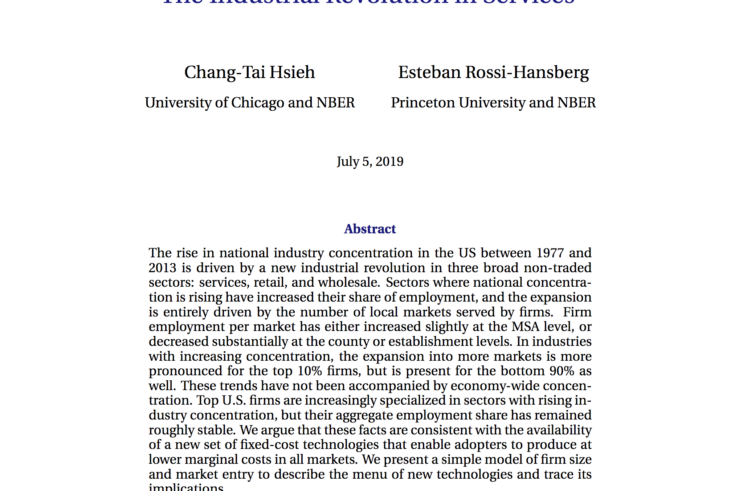Showing results for: “Valid C1000-170 Study Materials 🕗 C1000-170 Latest Exam Answers 🏮 Trusted C1000-170 Exam Resource 🦍 Search on 【 www.pdfvce.com 】 for 【 C1000-170 】 to obtain exam materials for free download 🐀Valid C1000-170 Dumps Demo”
It’s Time to Let STELA Go Off Into the Sunset and Reform Video Marketplace Regulation
Every 5 years, Congress has to reauthorize the sunsetting provisions of the Satellite Television Extension and Localism Act (STELA). And the deadline for renewing the law is quickly approaching (Dec. 31). While sunsetting is, in the abstract, seemingly a good thing to ensure rules don’t become outdated, there are an interlocking set of interest groups ... It’s Time to Let STELA Go Off Into the Sunset and Reform Video Marketplace Regulation
What if rising concentration were an indication of more competition, not less?
An oft-repeated claim of conferences, media, and left-wing think tanks is that lax antitrust enforcement has led to a substantial increase in concentration in the US economy of late, strangling the economy, harming workers, and saddling consumers with greater markups in the process. But what if rising concentration (and the current level of antitrust enforcement) ... What if rising concentration were an indication of more competition, not less?
A New Office of Technology Assessment: The Wrong Answer to the Wrong Question at the Wrong Time
Congress needs help understanding the fast moving world of technology. That help is not going to arise by reviving the Office of Technology Assessment (“OTA”), however. The OTA is an idea for another age, while the tweaks necessary to shore up the existing technology resources available to Congress are relatively modest. Although a new OTA ... A New Office of Technology Assessment: The Wrong Answer to the Wrong Question at the Wrong Time
Making Sense of the Google Android Decision (part 2): Ignoring Google’s Competitors
This is the second in a series of TOTM blog posts discussing the Commission’s recently published Google Android decision (the first post can be found here). It draws on research from a soon-to-be published ICLE white paper. (Left, Android 10 Website; Right, iOS 13 Website) In a previous post, I argued that the Commission failed ... Making Sense of the Google Android Decision (part 2): Ignoring Google’s Competitors
ICLE Files COPPA Review Comments Arguing the FTC Should Repeal the 2013 Amendments
Today, I filed a regulatory comment in the FTC’s COPPA Rule Review on behalf of the International Center for Law & Economics. Building on prior work, I argue the FTC’s 2013 amendments to the COPPA Rule should be repealed. The amendments ignored the purpose of COPPA by focusing on protecting children from online targeted advertising ... ICLE Files COPPA Review Comments Arguing the FTC Should Repeal the 2013 Amendments
Private Antitrust: What Hipsters Can Learn from Hulk Hogan
Antitrust populists have a long list of complaints about competition policy, including: laws aren’t broad enough or tough enough, enforcers are lax, and judges tend to favor defendants over plaintiffs or government agencies. The populist push got a bump with the New York Times coverage of Lina Khan’s “Amazon’s Antitrust Paradox” in which she advocated ... Private Antitrust: What Hipsters Can Learn from Hulk Hogan
Making Sense of the Google Android Decision (part 1): Four Problems with the EU Commission’s Market Definition
This is the first in a series of TOTM blog posts discussing the Commission’s recently published Google Android decision. It draws on research from a soon-to-be published ICLE white paper. The European Commission’s recent Google Android decision will surely go down as one of the most important competition proceedings of the past decade. And yet, ... Making Sense of the Google Android Decision (part 1): Four Problems with the EU Commission’s Market Definition
Economics is Dead. Long Live Economics! A Review of The Economists’ Hour
John Maynard Keynes wrote in his famous General Theory that “[t]he ideas of economists and political philosophers, both when they are right and when they are wrong, are more powerful than is commonly understood. Indeed the world is ruled by little else. Practical men who believe themselves to be quite exempt from any intellectual influence, ... Economics is Dead. Long Live Economics! A Review of The Economists’ Hour
On the Antitrust Risks of Four to Three Mergers: A Case Study of a Potential ThyssenKrupp/Kone Merger
Today, Reuters reports that Germany-based ThyssenKrupp has received bids from three bidding groups for a majority stake in the firm’s elevator business. Finland’s Kone teamed with private equity firm CVC to bid on the company. Private equity firms Blackstone and Carlyle joined with the Canada Pension Plan Investment Board to submit a bid. A third ... On the Antitrust Risks of Four to Three Mergers: A Case Study of a Potential ThyssenKrupp/Kone Merger
The Forgotten Virtues of Doing Nothing
This guest post is by Jonathan M. Barnett, Torrey H. Webb Professor Law, University of Southern California Gould School of Law. It has become virtual received wisdom that antitrust law has been subdued by economic analysis into a state of chronic underenforcement. Following this line of thinking, many commentators applauded the Antitrust Division’s unsuccessful campaign ... The Forgotten Virtues of Doing Nothing
The Snobbery of Bashing Big Tech
In the spring of 1669 a “flying coach” transported six passengers from Oxford to London in a single day. Within a few years similar carriage services connected many major towns to the capital. “As usual,” Lord Macaulay wrote in his history of England, “many persons” were “disposed to clamour against the innovation, simply because it ... The Snobbery of Bashing Big Tech
Rising Concentration, Rising Prices: Not So Fast
Wall Street Journal commentator, Greg Ip, reviews Thomas Philippon’s forthcoming book, The Great Reversal: How America Gave Up On Free Markets. Ip describes a “growing mountain” of research on industry concentration in the U.S. and reports that Philippon concludes competition has declined over time, harming U.S. consumers. In one example, Philippon points to air travel. ... Rising Concentration, Rising Prices: Not So Fast







